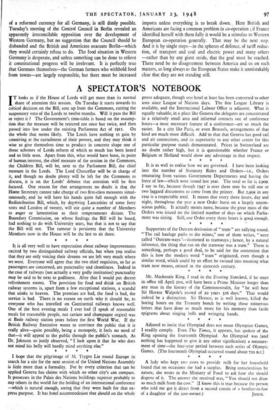A SPECTATOR 'S NOTEBOOK TT looks as if the House
of Lords will get more than its normal
share of attention this session. On Tuesday it starts towards its critical decision on the Bill, sent up from the Commons, cutting the suspensory veto of the Lords to twelve months. Will it pass the Bill or reject it ? The Government's time-table is based on the assump- tion that the measure will be rejected not once but twice, and then passed into law under the existing Parliament Act of 1911. On the whole that seems likely. The Lords have nothing to gain by conniving at the curtailment of their powers, and they may think it wise to give themselves time to produce in concrete shape one of those schemes of Lords_ reform of which so much has been heard and so little seen. Apart from this, what would have been, in point of human interest, the chief measure of the session in the Commons, the Children Bill, will be, next to the Parliament Bill, the chief measure in the Lords. The Lord Chancellor will be in charge of it, and though no doubt plenty will be left for the Commons to discuss, it is on the Lords' debates that attention will be first focused. One reason for that arrangement no doubt is that the Home Secretary cannot take charge of two first-class measures simul- taneously, and he will have his hands quite full enough with the Redistribution Bill, which, by depriving Lancashire of some forty seats and London of twenty, will stir quite a number of Members to anger or lamentation as their temperaments dictate. The Boundary Commission, on whose findings the Bill will be based, had nothing to do with University seats, but that is not to say that the Bill will not. The rumour is persistent that the University Members now in the House will be the last to sit there.
* * * *'






























 Previous page
Previous page